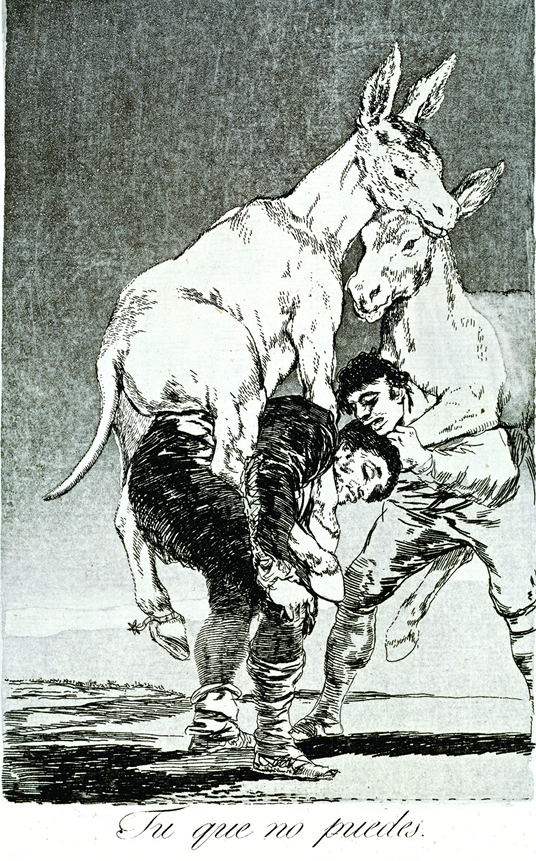
In this advanced seminar, we shall read and discuss a selection of academic papers that examine the cognitive, social, and political psychology of the American polity, with a particular stress on understanding the dynamics of socioeconomic inequality and on identifying possible ways, if any, of bringing about change to the better.
Goals:Instructor: Shimon Edelman
Time: M 2:00 — 4:25pm
Place: 205 Uris Hall
Weekly schedule: HERE.
The print on the right, titled Tú que no puedes ("You, who cannot") is by Francisco José de Goya y Lucientes. It is included as #42 in his series Los Caprichos (1797-1799).
Jump to:
Our present understanding of how the mind works and how minds evolve suggests that the pursuit of happiness is a basic human right in a deeper sense than warranted by the Declaration of Independence: our capacity for moment-to-moment emotional well-being and our ability to appreciate life as a whole are both rooted deep in the human nature. The human potential for happiness cannot, however, be realized if circumstances oppose it. Indeed, contrary to the popular myth of the happy pauper, studies show that widespread chronic financial hardship and insecurity and the inequality in power and wealth distribution — two chronic aspects of American socioeconomic malaise that the Great Recession has greatly exacerbated — are both detrimental to happiness.
A reflection on the dynamics of this predicament indicates that it may be self-reinforcing. A panoply of factors act not just to preserve the status quo, but to deepen the existing divides. Some of these factors are psychological. For instance, research findings show that inequality is associated both with increased illusory self-enhancement and with increased system justification, which in turn help perpetuate inequality. Moreover, both attention to in-group/out-group distinctions and the possession of personal power over others strengthen the perception of "the other" as less human, which may reduce the motivation of those in power to share it more equitably.
Other factors acting to preserve or exacerbate a skewed distribution of power are political. Corporate control of the media, the unbridled influence of private money on the machinery of democracy, and the continued attacks on science and erosion of public education all ensure that the society's attention is diverted away from the root causes of its ills. Instead of being encouraged to think, the average consumer of the news, increasingly deprived through the lack of education of cognitive tools for critical analysis, is lured into acquiescence with the status quo by Newspeak-like memes, which pretend that freedom to die from lack of health insurance is the epitome of freedom, or that everyone in this country can "make it" if only they work hard enough.
In this seminar, we shall read and discuss a selection of academic papers that examine the cognitive, social, and political psychology of the American polity, with a particular stress on understanding the dynamics of socioeconomic inequality and on identifying possible ways, if any, of bringing about change to the better.
Whether or not you're presenting in a given week, please come prepared with questions or comments regarding the readings.
IMPORTANT: please choose your two topics and co-presenters by Labor Day (Sept. 4). To sign up for one of the presentation slots, follow this link.
A typical presentation should include
| Presentations: | 70% |
| Participation in the discussions: | 10% |
| Final essay: | 20% |
Students with Disabilities: please give me your Student Disability Services (SDS) accommodation letter early in the semester so that I have adequate time to arrange your approved academic modifications. Meeting with me in my office hours will help ensure confidentiality. If you need an immediate accommodation for equal access, please speak with me after class or send an email message to me and/or SDS at sds_cu@cornell.edu. If the need arises for additional accommodations during the semester, please contact SDS.